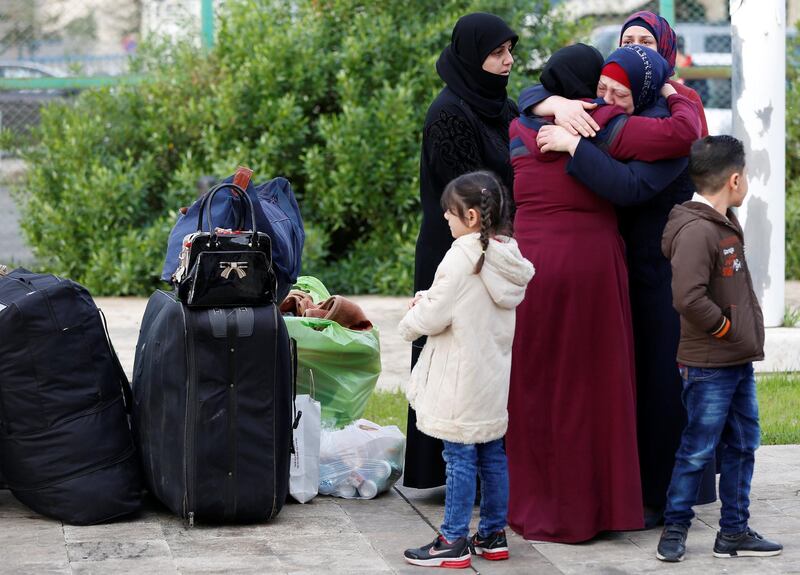A Russian plan to repatriate Syrian refugees living in Lebanon, Jordan and Turkey fizzled out because of a lack of western funding, Lebanese officials told The National.
Moscow’s July proposal to work with Washington and Damascus to help repatriate Syrians in neighbouring countries drew concern from refugees and the United Nations.
Russia expected the US and European Union to provide funds, but both have consistently shied away from supporting repatriation efforts in the absence of a political solution to the war in Syria, Lebanese officials said.
Although Russia is ready to supply logistical and material help, it is not prepared to fund the project, the officials added.
Cost estimates have not been made public. However, Russian analysts say Moscow will not spearhead a large repatriation plan without cash from western governments.
“A massive return is not possible without large-scale investment in Syria, as well as political reforms,” Yury Barmin of the Russian International Affairs Council, a think tank sponsored by the Kremlin, said.
Whether or not Russia can convince Syrian President Bashar Al Assad to introduce political reforms that would unlock foreign funding remains to be seen. But analysts in Moscow say the outlook is bleak.
“Good governance is something Russia could help with, but larger problems, like the influence of the security services on everyday life and Iran’s influence, will be hard for Russia to change,” Mr Barmin said.
_____________
Read more
US wants change in regime but not regime change in Syria, envoy says
No amount of handshakes will erase Bashar Al Assad's brutality
US-backed forces seize last ISIS-held town in Syria
_____________
Russia started lobbying for a repatriation plan in July, when it suggested to the US that the two countries co-operate. But the proposal received an icy reception in Washington.
This did not discourage Russian presidential envoy to Syria Alexander Lavrentiev who shortly after flew to Lebanon and Jordan to discuss the plan.
In Lebanon, he was welcomed with open arms by politicians who regularly complain about the burden posed by the Syrian refugees residing in the country – the highest number of refugees per capita in the world.
How exactly Russia wanted to organise the return of the 1.6 million Syrian refugees living in Lebanon and Jordan was unclear at the time.
However, Col Gen Mikhail Mizintsev, head of the Russian National Defence Management Centre, announced that working groups were heading to Jordan, Lebanon and Turkey, where joint HQs led by local Russian ambassadors were to be set up by July 30.
Following a meeting between top Lebanese officials, including Prime Minister-designate Saad Hariri, a joint Lebanese-Russian joint committee was created to follow up on the plan.
The Lebanese-Russian committee has met just three times since it was created late this summer, Amal Abou Zeid – who is one of the four Lebanese officials on the committee and represents the Ministry of Foreign Affairs – told The National.
Russia's plan may not have moved forward, but large numbers of Syrian refugees have started returning home, albeit without Russian help.
Jordan says that around 28,000 Syrians left voluntarily since the border between the two countries reopened in mid-October.
Lebanese intelligence started co-ordinating returns with the Syrian authorities and said that 80,000 Syrians went home between July and November 2018.
Although the Russian repatriation plan seems to have been put on the backburner, Lebanese officials try to remain optimistic.
“It’s the only initiative we have on the table that is worth pursuing,” Nadim Munla, special adviser to Mr Hariri on refugee affairs, said.
He said that European leaders were beginning to warm up to the idea of financing the return of refugees, especially after the Istanbul summit in late October between the leaders of Turkey, Russia, France and Germany.
“Although the initial reaction to the Russian initiative was not very positive from the international community, we noticed a re-activation of this initiative after the Istanbul summit,” he said.
“The Europeans accepted making available some financial resources as long as it was not classified as the reconstruction of Syria but as the reintegration of refugees back in their villages and cities.”
The US, however, is still reticent, said Mr Munla.
Ghadi Khoury, director of political affairs at the Lebanese Ministry of Foreign Affairs, downplayed the European change in attitude.
“From what I understand, there was a small change in position from the German and French leaders. But donor countries will not move ahead... as long as the Geneva process is not seriously undertaken,” he said.
Germany's embassy in Beirut had not responded to a request for comment by the time this article went to print.
The French embassy referred to President Emmanuel Macron’s statement in Istanbul in which he stressed there would be no refugee return as long as a “political process had not been undertaken as these refugees massively fled, above all, abuse committed by the [Syrian] regime”.
The UNHCR is not organising returns but it assists refugees when they ask for help.
“At some point, we will do so, but we are still discussing certain topics with the Syrian government such as access to refugees once they return, military service (obligatory between 18 and 42), and property rights,” said Mireille Girard, head of UNHCR in Lebanon.
However, Lebanese officials say they cannot wait until major powers decide the time has come for widespread returns.
“The presence of Syrians in the country costs us $1.7 billion a year according to the central administration of statistics. We cannot keep on waiting until there is a political solution in Syria,” Mr Abou Zeid said.





